|
|
|
Sort Order |
|
|
|
Items / Page
|
|
|
|
|
|
|
| Srl | Item |
| 1 |
ID:
173790
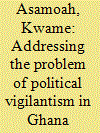

|
|
|
|
|
| Summary/Abstract |
Ghana entered into the Fourth Republic in 1993 after experiencing political instability over two decades. A defining feature that has characterized the Fourth Republic of Ghana and marred Ghana’s democratic credentials is the emergence of political vigilantism. Political vigilantism has basically been perpetuated by the two leading political parties in Ghana: the New Patriotic Party and National Democratic Congress. The major political actors in the political system of Ghana continue to express the debilitating effects of political vigilantism on Ghana’s democratic advancement, nevertheless, it continues to persist in monumental proportion in our political dispensation. Using a qualitative research approach, the paper examines the factors responsible for the pervasiveness of political vigilantism under the Fourth Republic of Ghana and proffer some plausible solutions to address this political canker.
|
|
|
|
|
|
|
|
|
|
|
|
|
|
|
|
| 2 |
ID:
085256
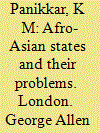

|
|
|
|
|
| Publication |
London, George Allen and Unwin Ltd., 1959.
|
| Description |
104p.
|
|
|
|
|
|
|
|
|
|
|
|
Copies: C:1/I:0,R:0,Q:0
Circulation
| Accession# | Call# | Current Location | Status | Policy | Location |
| 000457 | 309.15/PAN 000457 | Main | On Shelf | General | |
|
|
|
|
| 3 |
ID:
137896
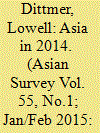

|
|
|
|
|
| Summary/Abstract |
THOUGH SOME MAY HAVE APPROACHED the centenary of the outbreak of World War One with a certain superstitious foreboding, 2014 in Asia was a pretty good year. As Xi Jinping put it in his May 21 address to the CICA (Conference on Interaction and Confidence Building Measures in Asia), ‘‘Asia today, though facing more risks and challenges, is still the most dynamic and promising region in the world.’’1 Economically, Asia remains the fastest growing region, averaging an estimated 6.1% GDP growth for the year, and the forecasting consensus predicts an even better next year. This is an impressive performance in the wake of the global 2009–13 slowdown and particularly the recent cooling of the Chinese locomotive. Politically, the headline for the year is democratic resilience, with relatively honest elections in Afghanistan, India, Bangladesh, Indonesia, and (jumping a few days into 2015) Sri Lanka. As for international security, on the other hand, it was a year of rising tensions: violent terrorist attacks in Afghanistan, Pakistan, Burma/Myanmar, India’s Assam, China’s Xinjiang; continuing confrontations over maritime boundaries in the South and East China Seas; and renewed fighting between India and Pakistan over Kashmir.
|
|
|
|
|
|
|
|
|
|
|
|
|
|
|
|
| 4 |
ID:
084884
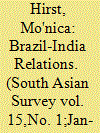

|
|
|
|
|
| Publication |
2008.
|
| Summary/Abstract |
Relations between Brazil and India seem to be blooming recently, favoured by a mix of domestic and international developments. Together with an expanded terrain of common interests in multilateral political and economic matters, both countries share the trend of perceiving bilateralism as a stimulating and useful learning process. Furthermore, they have assumed a leading role in the process of revival of South-South diplomacy in world affairs. Brazil and India have become major actors in recent proposals aimed at simultaneously promoting a renewed configuration of multilateral institutions and innovative inter-state coalition building among developing countries. The India, Brazil, South Africa (IBSA) initiative is part of this strategy. However, time and maturity are still needed to assert that Brazil-India bilateral ties and converging interests will build up as a relevant dimension for each other's international insertion as well as for an effective renewal of South-South relations in the twenty-first century.
|
|
|
|
|
|
|
|
|
|
|
|
|
|
|
|
| 5 |
ID:
084212
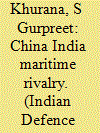

|
|
|
| 6 |
ID:
086329


|
|
|
|
|
| Publication |
2009.
|
| Summary/Abstract |
The doubling of grain prices over the past years has already set off violent protests in over 30 developing counteries and led to the overthrow to the Haitian prime minister Jacques Edouard Alexis.Even though the media has provided extensive coverage and analysis of the causes of the increase in food prices, the potential political and security consequences have been given little attention.
|
|
|
|
|
|
|
|
|
|
|
|
|
|
|
|
| 7 |
ID:
148769
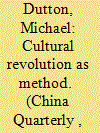

|
|
|
|
|
| Summary/Abstract |
This paper treats the Chinese Cultural Revolution as a means by which to open on to a more affective approach to the question of the political. It examines one piece of art-technology of that period and shows the way it intuitively worked within the fluidity of power to produce political intensity. This one technology is a microcosm of the Cultural Revolution notion of the political that was built around an attempt to channel and harness affective power towards revolutionary ends. Both because it attempts to direct the political through the affective dimension and because its methods of doing so resembled contemporary art practices, this paper opens on to the possibilities of a method based on an art rather than a science of the political.
|
|
|
|
|
|
|
|
|
|
|
|
|
|
|
|
| 8 |
ID:
153649


|
|
|
|
|
| Summary/Abstract |
The present paper aims to analyse a number of those slogans collected from the sit-in quarters in Egypt, Libya and Yemen. Using political discourse analysis, it unravels various typical discourse structures and strategies that are used in slogans in the construction of a sub-genre of political discourse in the Arab world. Drawing data from several mediums, including banners, wall graffiti, audio-visual instruments, chanting, speeches and songs, this paper tries to show the extent to which the slogans serve as a medium by which political complaints and comments are dispensed and consumed. This paper draws on a rhetorical analysis to find out their persuasive effect on shaping the Arab intellect and on the change of the political atmosphere in the region. Lastly, this paper attempts to show to what extent the slogans meet the standards of political discourse and whether they can be considered as a sub-genre of political discourse or not.
|
|
|
|
|
|
|
|
|
|
|
|
|
|
|
|
| 9 |
ID:
084411
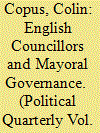

|
|
|
| 10 |
ID:
086407
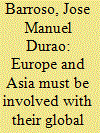

|
|
|
|
|
| Publication |
2009.
|
| Summary/Abstract |
I wish to welcome the new members of ASEM. With the summit in Beijing of 24 October 2008 Europe is able to engage virtually the whole of Asia through ASEM. This is cause for celebration, and it means that we will be even better placed to advance our shared policy goals in the international arena.
|
|
|
|
|
|
|
|
|
|
|
|
|
|
|
|
| 11 |
ID:
174790
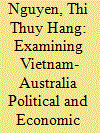

|
|
|
|
|
| Summary/Abstract |
This article seeks to examine Vietnam-Australia bilateral relations from 2000 to 2018. It will focus on political and economic dynamics of this relationship. Canberra and Hanoi established initial diplomatic contacts in 1973. After the first 27 years of approaching each other, they both recognized that it is in their mutual interests to strengthen and deepen their political and economic linkages. Therefore, from 2001 to 2018, Hanoi and Canberra continued to take practical steps to create political establishments and economic chances for greater successes in their relations. Like any other bilateral relations in world politics, there may be differences between Canberra and Hanoi, yet these differences have not prevented them from bringing their relationship to a new height.
|
|
|
|
|
|
|
|
|
|
|
|
|
|
|
|
| 12 |
ID:
075768
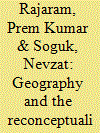

|
|
|
| 13 |
ID:
139039
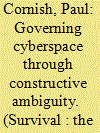

|
|
|
|
|
| Summary/Abstract |
At its simplest, cyberspace is a global medium for communication and information exchange between computers and their human operators, an environment (of sorts) in which it is possible for digital signals to be sent, received and processed. Like other communications media, the operating
conceit of cyberspace is that it should be indifferent to the quality and meaning of the traffic it carries. It comes as no surprise, then, that cyberspace can be a vehicle for challenge, insecurity, instability, crime and competition. But it can just as often signify opportunity: commercial, economic, cultural, political, social and even moral, in terms of individual human fulfilment.
|
|
|
|
|
|
|
|
|
|
|
|
|
|
|
|
| 14 |
ID:
085310
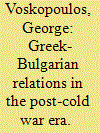

|
|
|
|
|
| Publication |
2008.
|
| Summary/Abstract |
The Balkan Peninsula has been an unstable regional security subsystem because of a number of defining and qualitative parameters, namely, overt or covert challenges to the territorial status, interethnic conflicts, the "great idea" syndrome, out-of-system interference, and minority expansionism. In the post-Cold War era, European Union enlargement in the area assisted the establishment of a core of systemic stabilizers that could, under certain conditions, absorb inherent instability. Greece and Bulgaria constitute an axis providing eufunctional input to the regional stability and security equation. Their partnership has been an example of inter-Balkan cooperation and an effort to establish an equilibrium mechanism to enhance the cohesion of the region
|
|
|
|
|
|
|
|
|
|
|
|
|
|
|
|
| 15 |
ID:
186265
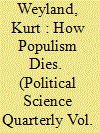

|
|
|
|
|
| Summary/Abstract |
KURT WEYLAND examines the weaknesses of populist leadership. He argues that populist leaders are prone to errors and misdeeds, have difficulty dealing with other political forces, and face institutional and external constraints. Consequently, he concludes, they damage and suffocate democracy not as easily and frequently as recent observers have feared.
|
|
|
|
|
|
|
|
|
|
|
|
|
|
|
|
| 16 |
ID:
084882
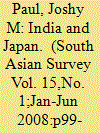

|
|
|
|
|
| Publication |
2008.
|
| Summary/Abstract |
The relationship between Japan and India has been influenced by the international power configuration over time. In the early post-War period, both countries embraced idealistic moor-ings about how the world should be. In due course of time, the United States (US) alliance system put Japan in the western camp of Cold War power politics while India followed a policy of non-alignment. However, with the end of the Cold War and the transformation of Asia into a composite power playground, India and Japan have developed a much closer relationship. The relative decline of America's strategic interest towards the East Asian region and the changing dynamics of security in Asia have forced Japan to search for new partners in Asia, culminat-ing in the present strategic partnership with India. It is in this context that this article probes Indo-Japanese relations by analysing their economic, political and strategic facets.
|
|
|
|
|
|
|
|
|
|
|
|
|
|
|
|
| 17 |
ID:
139866
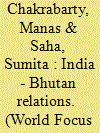

|
|
|
|
|
| Summary/Abstract |
International Relation means the diplomatic-strategic relation of states and the characteristic focus of International Relation revolve on issues of war and peace, conflict and cooperation. Further, it is also cross border transactions of all kinds, political, economic and social
|
|
|
|
|
|
|
|
|
|
|
|
|
|
|
|
| 18 |
ID:
138576
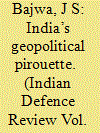

|
|
|
|
|
| Summary/Abstract |
There is no doubt that India will have to change; literally pull itself up by its boot laces. A changed India would imply transformation in the way things function in this country. It will imply accountability of those in authority; transparency in all functions of the government; on time delivery; a great measure of responsibility by those in authority and answerability for failure in providing service. Finally, it will imply the demolition of the VIP culture and the ushering in of a consultative format by the people’s representatives for inclusion of the voters in the national decision making process.
|
|
|
|
|
|
|
|
|
|
|
|
|
|
|
|
| 19 |
ID:
119837
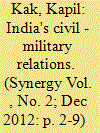

|
|
|
| 20 |
ID:
085299
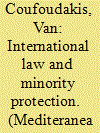

|
|
|
|
|
| Publication |
2008.
|
| Summary/Abstract |
In this essay a largely forgotten human rights issue involving the fate of the Greek-in-origin population that inhabited the Turkish islands of Imbros and Tenedos is examined. Exempted from the Greek-Turkish population-exchange agreements concluded following the end of World War I, the Greek population of the two islands was granted specific civic, cultural, and religious rights by the 1923 Treaty of Lausanne. The treaty remains valid to this day. Turkey deliberately violated the rights of this population because of its ethnicity, religion, and language. The author analyzes the methods used by Turkey to ethnically cleanse the two islands and the options available to the former residents of these islands as well as to the governments of Greece and Turkey to resolve the documented violations of the Treaty of Lausanne and of the European Convention on Human Rights.
|
|
|
|
|
|
|
|
|
|
|
|
|
|
|
|
|
|
|
|
|